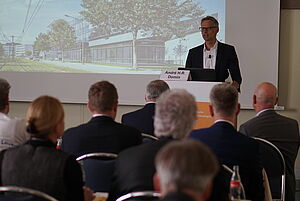At the German Biotechnology Days 2019, the luncheon on Tuesday, 9th April, focused on the biotech scene. The question of whether and how the biotech scene in Germany can still be helped is mainly posed by the challenges financing biotechnological companies to the founders. This question was addressed in an open discussion on innovation funding.
The CEO of Apollo Therapuetics LLP, Dr. Richard Butt, and the CEO of the Heidelberg Technology Park, Dr. André Domin, presented their approaches to innovation funding in front of a full audience.
The Technology Park has been dedicated to promoting innovative ideas since 1984: Starting with the offer of the Life Science Accelerator Baden-Württemberg, which supports start-up ideas in the field of biotechnology for twelve months, through the mediation of contacts to mentors and investors, to a suitable space for the young companies. The technology park accompanies innovations from research to the patient's bed and offers suitable services in every phase.
BioRN Cluster Management GmbH, which was founded in 2008 in cooperation with BioRN Network e.V., aims to promote regional and supra-regional innovation transfer, expand the infrastructure for research and development and initiate partnerships with other leading international health research locations. Together they form the legal basis for the further development of the Rhine-Neckar BioRegion into one of the most successful BioRegions in Europe.
Richard Butt presents Apollo Therapeutics as the joint project of three leading British universities (Imperial College London, University College London and the University of Cambridge) and three global pharmaceutical companies (AstraZeneca, GlaxoSmithKline, Johnson & Johnson Innovation). The company is an example of how dedicated translational funding and expertise in drug discovery can work for novel therapeutics derived from UK academic research to accelerate them to clinical application. By providing rapid and independent access to the necessary resources, Apollo Therapeutics promotes innovation and wins the industry for the research results of UK academic research.
The result after extensive discussion: developments in the life sciences need time and secure funding. The speakers offer opportunities to further develop innovative ideas and business models and support the transfer of knowledge from research to industry.
